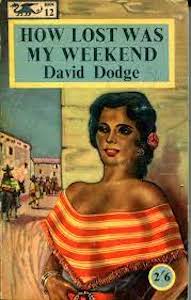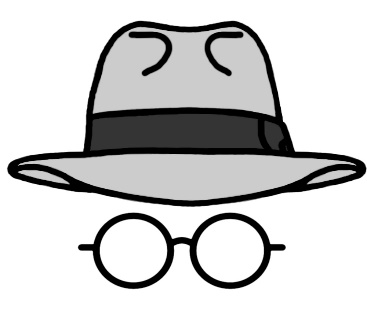Ripster Revivals #2: David Dodge
Fair enough, this is a bit of a vanity project, but the Editor of Shots agreed to it months ago in order to keep me quiet and off the streets after my retirement from the Getting Away With Murder column. It is not a ‘bucket list’ rather an occasional series of essays featuring books – crime novels and thrillers – which I have been meaning to read, or re-read for, though I hate to say it, up to fifty years or more. Finally, without the pressure of having to consider the hundreds of new crime novels being churned out week after week, I have the time and the incentive and I know I will become reacquainted with some favourite authors and almost certainly discover new ones.
The name David Dodge will be familiar to anyone who has lurked in an English second-hand bookshop flicking through piles of green Penguin ‘crime’ paperbacks from the mid-1950s. Among the Agatha Christies, Margery Allinghams, Simenons and Ngaio Marshes, which were published in print runs of 100,000 copies per title, there would always be a David Dodge book, its generic UK livery (distinctive but plain) giving no clue as to what sort of crime or ‘mystery’ novel it was likely to be.
At least half-a-dozen David Dodge thrillers were published as green Penguins in 1955-56, which suggests he had a decent readership back then, but he seems to have faded from memory rather quickly in this country and oddly seems ill-served by omission from many a history of crime-writing or reference book (at least the ones I own).
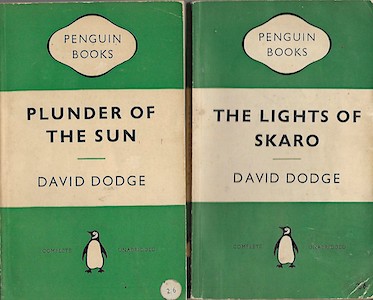
I was only ever aware of David Dodge titles in those green Penguin editions and he was undoubtedly better served by his American paperback publishers, as in the cover to his best-known title, To Catch A Thief, originally published in 1953, the film rights bought immediately by Alfred Hitchcock and filmed with Cary Grant in the lead.
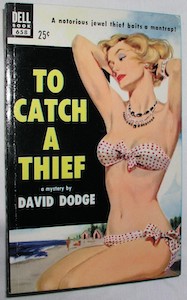
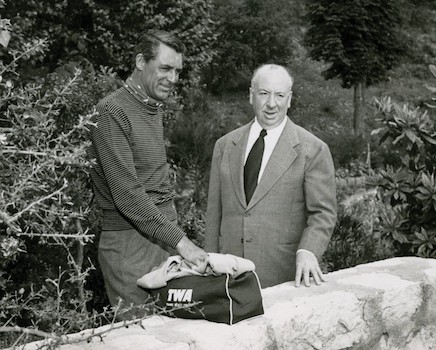
Re-reading To Catch A Thief and Plunder Of The Sun and his spy thriller The Lights Of Skaro for the first time, there is no doubt that Dodge could produce readable prose, some memorably flawed male characters (his females were less successful) and scenes of genuine tension, but it was the variety of his settings which makes his fiction stand out from many of his contemporaries. Thief was famously set on the French Riviera; Plunder begins in Chile and climaxes in the high Andes on the border between Peru and Bolivia and Skaro takes place in a fictitious communist Balkan country. Dodge used the Riviera, Mexico and pre-WWII Los Angeles as settings in other books, clearly making use of his love of travelling and his second career as a travel writer. Indeed he is supposed to have said that while most writers travel to research their writing, he wrote in order to fund his travelling.
He was clearly at home on the Côte d’Azur when he chronicled the adventures of John Robie in To Catch A Thief. Robie, an American cat-burglar known as Le Chat, terrorized the Riviera, or at least the rich female residents with lots of jewellery, in the years before the war. Caught and imprisoned just as war broke out, he was released by the invading Germans and dumped in Vichy France. He joined the Maquis and fought in the resistance for the rest of the war, after which he retired to Provence once he realised he could not take his accumulated cash (from jewel-thievery) out of the country. As heroes of the resistance he and fellow criminals (now also reformed) felt safe from further prosecution, which is probably why he didn’t bother to change his name and it seemed he was immune until, that is, a new wave of cat burglaries hits the Riviera and it appears that Le Chat is back in business.
Robie goes on the run, determined to catch the Cat impersonator and prove that he really has retired with the help of his network of buddies from his days in the Maquis. For a supposedly very clever master thief, Robie comes across as not very bright on occasion and almost all of the female characters are described simply by the amount of diamond necklaces they wear (or don’t). So much so that the reader almost wants the counterfeit ‘Cat’ to succeed, but of course they don’t and after a roof-top chase, true romance triumphs.
The women in Plunder Of The Sun tend to get slapped around a bit, which was probably par for the course for 1950, given this was the heyday of Mickey Spillane and film noir. Globe-trotting, wise-cracking freelance investigator Al Colby is engaged as a bodyguard to accompany an invalid antique dealer and the package he is carrying, from Chile to Peru by sea. On the voyage, Colby becomes suspicious of the other passengers, at least one of whom has designs on the secret bundle he is entrusted with. This section of the novel is very well-done, reminiscent of Eric Ambler’s Journey Into Fear, but then the antique dealer dies and Colby is left in Peru holding what turns out to be an Inca treasure map written in a forgotten language.
By a frankly ridiculous method Colby manages to piece together (literally) the map and have it translated and now it becomes a race between him and the not-difficult-to-spot villain to the treasure and a climax on Lake Titicaca. At this point, the reader is crying out for Indiana Jones to arrive and save the day, but the wounded Colby struggles on at the ‘treasure of Amaru’ is saved to be donated to a museum. (Which Indiana Jones would never have got round to doing.)
Plunder Of The Sun is a decent enough adventure thriller with some genuine flashes of suspense. I was unaware until recently that it had been filmed, starring Glenn Ford, in 1953 and the novel is one of the few Dodge titles to have been revived – by Hard Case Crime in 2005.

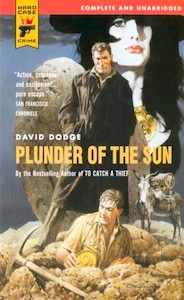
Dodge’s 1954 Cold War thriller The Lights Of Skaro plays on a common theme in Cold War thrillers of the period: getting persons of interest (usually scientists or political dissidents) out of countries behind the Iron Curtain. Although it might sound like the home planet of the Daleks, the Skaro of the title is a border town with a bridge between the ‘Peoples Free Federal Republic’ and the democratic west policed by British and American troops.
Trying to get to Skaro and out of the country are a pair of American foreign correspondents, Jess and Cora, who have stumbled on a plot by the Republic’s head of security to make himself supreme leader. All the apparatus of a Big Brother state is evident in the ‘Free’ Republic: compulsory singing of party songs, loudspeakers of every street corner broadcasting slogans, an oppressed peasantry, censorship, a thriving black market and an all-powerful secret police. No wonder the two Americans want out and most of the novel concerns their run for the border with the espionage back story told in flashback.
Their journey is a tough one and some of the hardships experienced brought to mind Geoffrey Household’s ‘Rogue Male’ struggling to hide in the underbrush as the author piles on the physical discomforts. Our pair of scribes, who start off bickering but eventually fall in love, have it rough, drinking out of puddles, hiding in ruined houses, adopting disguises by wearing flea-ridden clothes and travelling, sometimes sleeping, with a flock of sheep. Along their journey there is one especially poignant scene where they find themselves walking through a vandalised graveyard, noting that all the damaged graves were Muslim.
Do they make it across the border at Skaro? After a frantic panic attack and then a massive firefight, of course they do.
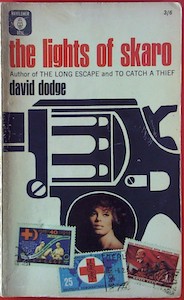
*
David Francis Dodge (1910 – 1974) was a certified public accountant in California, who joined the US Naval Reserve after the attack on Pearl Harbour in the year his first mystery novel, Death and Taxes, was published. After WWII he set out with his family to drive to Guatemala and began to develop a career for writing humorous travel books.

In one of the crime fiction reference works which does mention him, Whodunit? edited by H.R.F. Keating, he is described as ‘One of the exceptional suspense novelists of the forties and fifties. Dodge had literary style as well as being a fine story teller.’
His second career as a travel writer seems to have eclipsed his crime writing with ‘rich man’s’ and often ‘poor man’s’ guides to South America, Mexico, the French Riviera, Turkey and the Orient, my favourite title being How Lost Was My Weekend.
